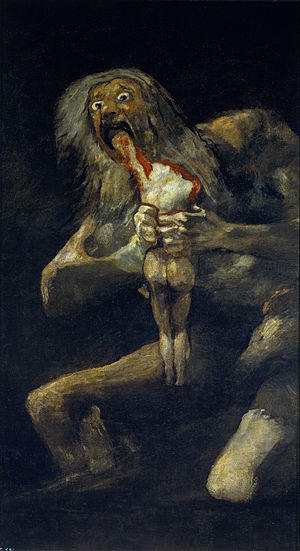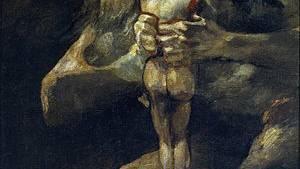Religion - The Accepted Insanity?
Source: realitysandwich.com

Religion and Insanity
1. Mother Eagle
A friend of mine is getting into angels, and I don’t know what to do.
The problem is that for the last several years, my spiritual path has been about more openness, more sensitivity, and more awareness to the subtle shifts of energy that otherwise escape our notice. Beginning on my first meditation retreat, years ago, I’ve learned that the reflexive doubt and cynicism of which I have been so proud – and which are such fixtures in contemporary literary culture – are often not the sophistication they pretend to be, but instead are a defense mechanism, bespeaking not cultured sophistication but shame, fear, or even ignorance. I’ve learned this through my own subjective experience and through conversations and interactions with other people: what seems to be analytical cleverness is often a kind of cowardice.
So a cultivated openness – not erasing doubt and judgment, but suspending them long enough for experience to really unfold – is the key. Significant shifts do sometimes occur. Only a few years ago, for example, I asked myself whether "energy" was real, or nonsense. But then, a while later, while working with Body Electric massage techniques, I experienced it myself: how, with my hands inches above my partner’s body and with his eyes closed, I could cause "energetic" changes in his body. I moved, and he moved; I concentrated energy, and he shook. Weird, yes – perhaps so weird that, as one of my editors once told me, I lose credibility by talking about it. But it is also a phenomenon with no other explanation that I’ve been able to generate. I still don’t know what energy is, but I know that there is more to heaven and earth than is dreamt of in scientific-materialist philosophy.
But openness still has its limits. As my excursions into the New Age progress, I’ve met weirder and weirder people (many of whom post here at Reality Sandwich!). Usually, that’s a good thing; the world would be a lot better off with more weird people than more normal ones, and "weird" is often a reduction of "wise." Other times, though, weird is just weird. I find myself having moments a bit like the scene in Augusten Burroughs’ Running with Scissors, when Dr. Finch, the oddball psychiatric Svengali who acts as a surrogate father for Burroughs, says that the shapes of his bowel movements are messages from God. We’ve wondered about Finch’s sanity throughout the book (and film), but in that moment, we realize that he has been nuts all along. In a narrative searching for a sane center, Finch reveals that he isn’t going to be it.
 So, when my friend tells me that he’s communing with Mother Eagle and reading Tarot cards, I don’t know what to do. On the one hand, I want to be open. On the other hand, I don’t believe in the things he believes in, and don’t see how a sane person – by which I do not mean someone who adheres to conventional modes of thought and behavior (since those may well be insane) but someone who is able to distinguish fantasy from reality, truth from falsehood – could believe in these things. Of course, reality may well have many planes and aspects, and it may well be that what some materialistic psychiatrists call psychosis is really just a better sensitivity to those other planes. It’s also true that even the weirdest of weirdos is different from a psychotic person who doesn’t get out of the way of buses, or can’t put on clothes. Perhaps the fear of "insanity" is really the fear of enlightenment. But at the very least, there seems to be something important lost when reason is demoted too much.
So, when my friend tells me that he’s communing with Mother Eagle and reading Tarot cards, I don’t know what to do. On the one hand, I want to be open. On the other hand, I don’t believe in the things he believes in, and don’t see how a sane person – by which I do not mean someone who adheres to conventional modes of thought and behavior (since those may well be insane) but someone who is able to distinguish fantasy from reality, truth from falsehood – could believe in these things. Of course, reality may well have many planes and aspects, and it may well be that what some materialistic psychiatrists call psychosis is really just a better sensitivity to those other planes. It’s also true that even the weirdest of weirdos is different from a psychotic person who doesn’t get out of the way of buses, or can’t put on clothes. Perhaps the fear of "insanity" is really the fear of enlightenment. But at the very least, there seems to be something important lost when reason is demoted too much.Moreover, what’s really the difference between unreflexive belief in Mother Eagle and unreflexive belief in the dogmas of fundamentalism? Of course, the major difference is that few New Age practitioners are ethnocentric or violent. On the contrary, they love all spiritual practices – darshan, deeksha, davening, whatever – because these practices are understood functionally, in terms of what they do for the self. Non-mythic religion generally avoids the problems of violence and ethnocentrism that seem an inexorable part of mythic religion. (On the other hand – those peaceful New Age meditators? Watch what happens if you move their sacred yoga mat.) But even if we set aside the dangers of myth, there’s still the beliefs themselves.
2. Don’t worry – it’s just an archetype
Spiritual, esoteric, and religious believers often make two kinds of unusual claims: 1) those fly in the face of evidence; or 2) those that seem to trust direct experience too greatly. The first type is more typical of traditional Western religion. For example, Rev. Ted Haggard, before he stepped down as president of the National Association of Evangelicals amid accusations that he paid a man for sex (repeatedly, over a period of three years – and did crystal meth to boot), told Barbara Walters that heaven was a real, physical place, beyond the known universe, where you could eat all you want and never get fat, and where there were mansions for all the faithful. Such ideas, like the belief in a physical Devil (held by 70% of Americans, according to Pew Institute surveys) or the notion that Christ will appear on Earth in the next 50 years (held by 50%), are so tied to supernatural myth, superstition, and unquestioned traditions received from authority, and so contradict our best available evidence, that modern and postmodern people can easily raise their eyebrows at anyone who hold them.
[...]
Read the full article at: realitysandwich.com
Right Image: Saturn Devouring His Son, Francisco Goya
Top Image: ???






















